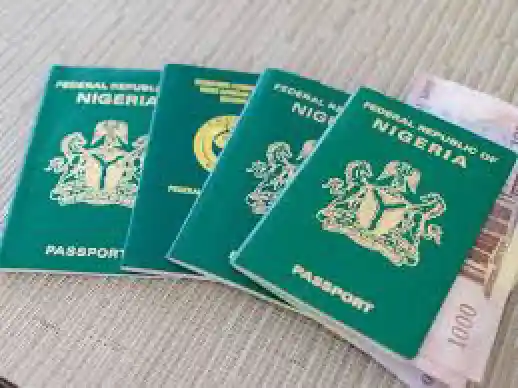The Nigeria Immigration Service (NIS) has announced a major increase in the cost of obtaining an international passport in the country.
In a statement released on Thursday, the Service’s Public Relations Officer, A.S. Akinlabi, confirmed that the revised fees will take effect from September 1, 2025, and will apply to applications processed within Nigeria.
According to the new directive:
- A 32-page passport with 5-year validity will now cost ₦100,000.
- A 64-page passport with 10-year validity will now cost ₦200,000.
The latest adjustment represents an increase of about 150%, compared to the previous official rates.
TJ News Nigeria reports that the changes only affect applications filed in Nigeria, while fees for Nigerians in the diaspora remain unchanged.
Passport Fees for Nigerians Abroad Unchanged
For Nigerians living outside the country, passport application fees remain as follows:
- $150 for a 32-page passport with 5-year validity.
- $230 for a 64-page passport with 10-year validity.
The Immigration Service explained that the decision was aimed at balancing revenue generation, service delivery, and the long-term sustainability of Nigeria’s passport production system.
Why the Fees Were Increased
The NIS said the review of passport fees was necessary to cover operational costs, maintain production quality, and ensure the security of travel documents.
“The review, which only affects Passport Application fees made in Nigeria, was carried out after careful consideration of prevailing economic realities,” Akinlabi noted in the statement.
The Service emphasized that Nigeria’s international passport remains one of the most secured identity documents in Africa, with biometric features and advanced anti-counterfeit technology.
Impact on Nigerians
The announcement comes at a time when Nigeria’s unemployment rate and cost of living have reached record highs.
- Many citizens, especially the youth, see migration as an escape route to pursue better opportunities abroad.
- The ongoing ‘Japa’ phenomenon—a wave of mass emigration—has further increased the demand for passports.
With the new cost implications, analysts believe some low- and middle-income applicants may struggle to afford international travel documents.
The ‘Japa’ Wave and Nigeria’s Brain Drain
Since the COVID-19 pandemic, Nigeria has witnessed a surge in migration to countries such as:
- United States
- United Kingdom
- Canada
- European Union states
The migration is driven by the search for better education, job opportunities, healthcare, and security.
The World Bank reported in 2023 that Nigerians in the diaspora remit over $20 billion annually, making them a significant contributor to Nigeria’s economy.
However, experts have raised concerns that while diaspora remittances provide economic relief, the large-scale exit of professionals, students, and skilled workers may have long-term negative effects on Nigeria’s development.
AfDB’s Warning on Japa
Outgoing President of the African Development Bank (AfDB), Dr. Akinwumi Adesina, has previously described Nigeria’s rising migration trend as a “big loss” to Africa.
He noted that the continent has over 465 million young people between the ages of 15 and 35, and emphasized the need for African governments to invest in job creation and innovation.
“I do not believe that the future of our young people lies in Europe, America, Canada, Japan, or China. It should lie in Africa, growing robustly and able to create quality jobs,” Adesina said.
He warned that Africa must not turn what should be a demographic advantage into “somebody else’s problem.”
Public Reactions to the New Passport Fees
While the Immigration Service insists that the increase is necessary, reactions from citizens have been mixed:
- Supporters argue that the fees will help the government sustain passport production and curb racketeering.
- Critics say the timing is insensitive, given the current economic hardship, inflation, and high unemployment rates.
- Some Nigerians on social media have pointed out that with the Japa movement at its peak, many desperate applicants will still pay the new rates.
Comparison with Other African Countries
Passport fees vary across Africa, with Nigeria now ranking among the highest.
- Ghana charges the equivalent of ₦35,000–₦40,000 for standard passports.
- South Africa charges around ₦30,000.
- Kenya charges between ₦25,000 and ₦35,000.
Pay Attention To:
- Nigerian Passport Renewal in 2025: New Rules and Fees
- How to Apply for a U.S. Visa in Nigeria (Step-by-Step Guide)
With the new structure, Nigeria’s passport has become significantly more expensive compared to its neighbors, though authorities argue that the quality and security features justify the pricing.
What Nigerians Should Know
- Effective Date: The new fees apply from September 1, 2025.
- Scope: Only affects applications made within Nigeria.
- Diaspora Fees: Remain unchanged.
- Payment: Applications are still processed through the official NIS portal.
- Fraud Alert: Nigerians are warned against paying agents or third parties outside the official channel.
Key Takeaway
The Nigerian government, through the Immigration Service, has raised international passport fees by about 150%. While officials say the review was necessary, the development has sparked public concern, especially amid ongoing economic hardship and the rise of the Japa migration trend.
The real test will be whether the fee hike translates into faster processing, reduced bottlenecks, and improved passport services for millions of Nigerians at home and abroad.
